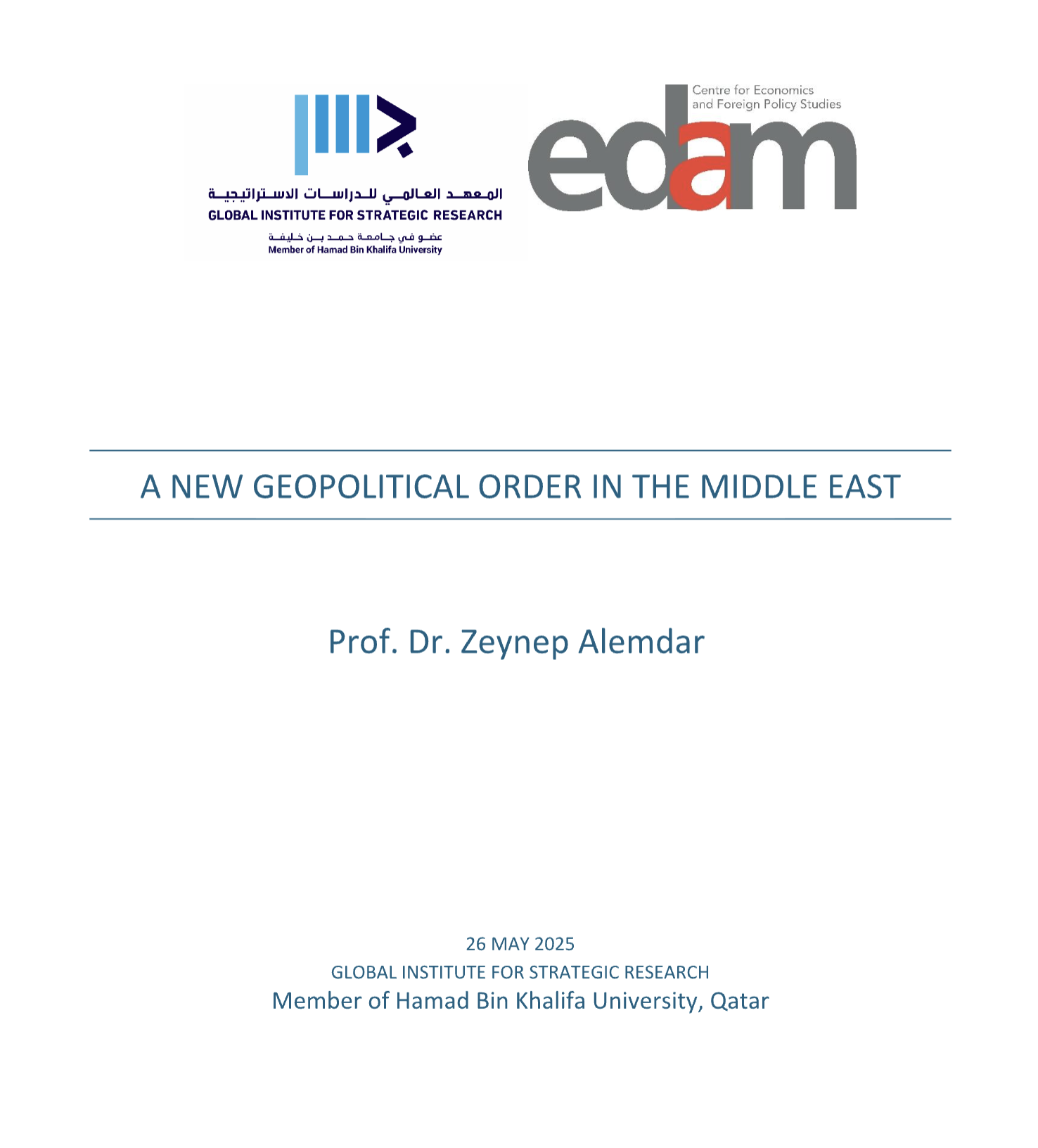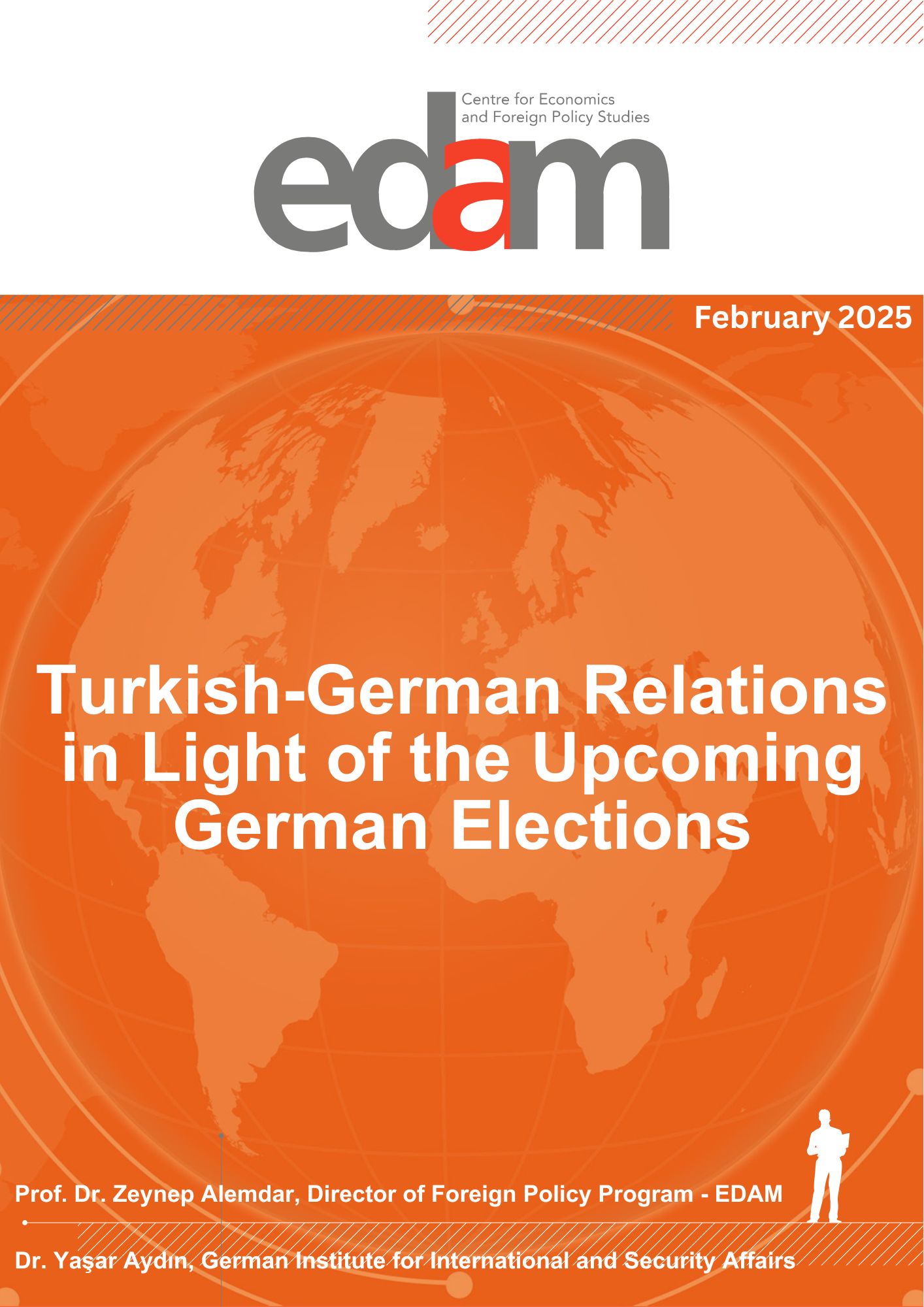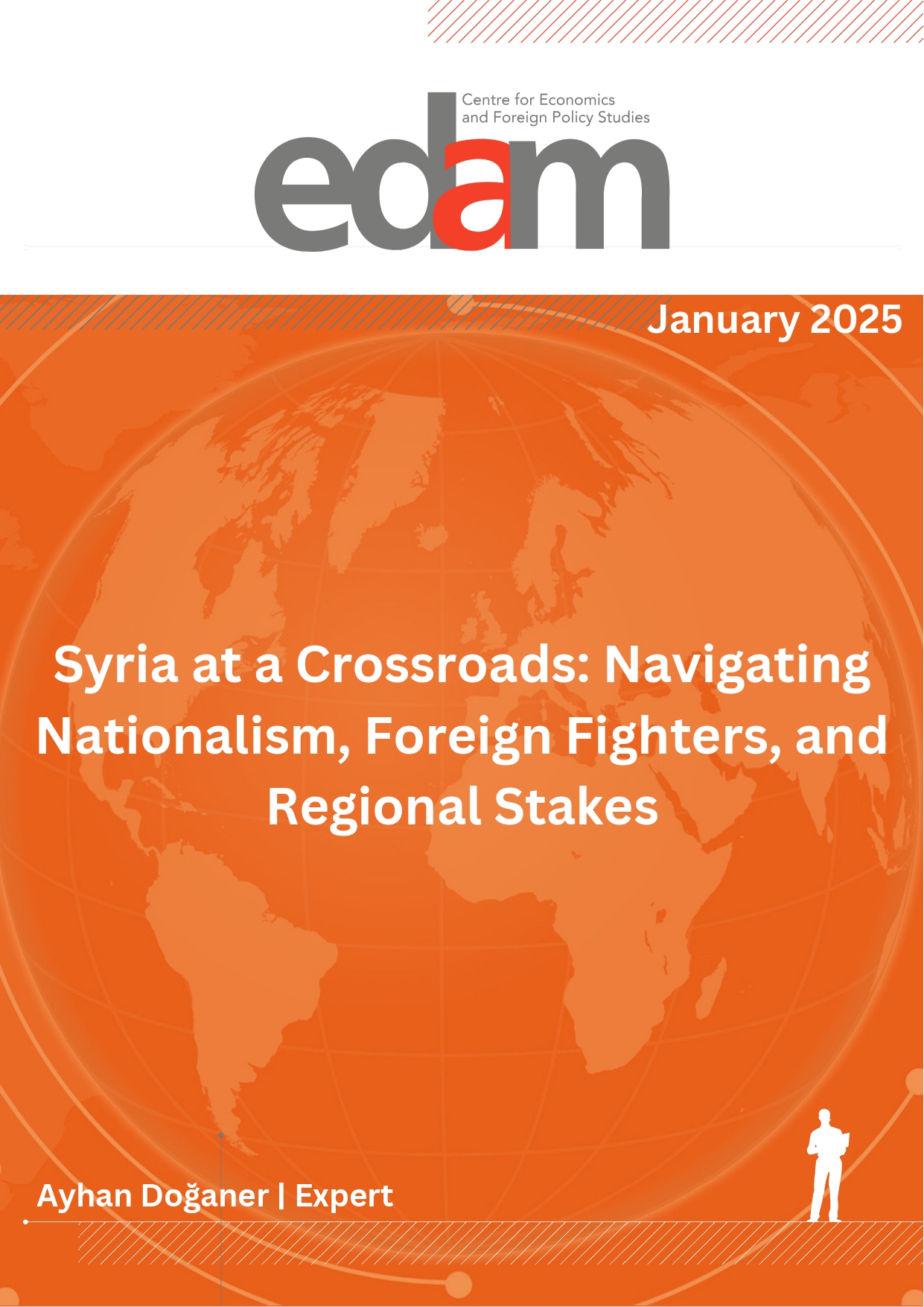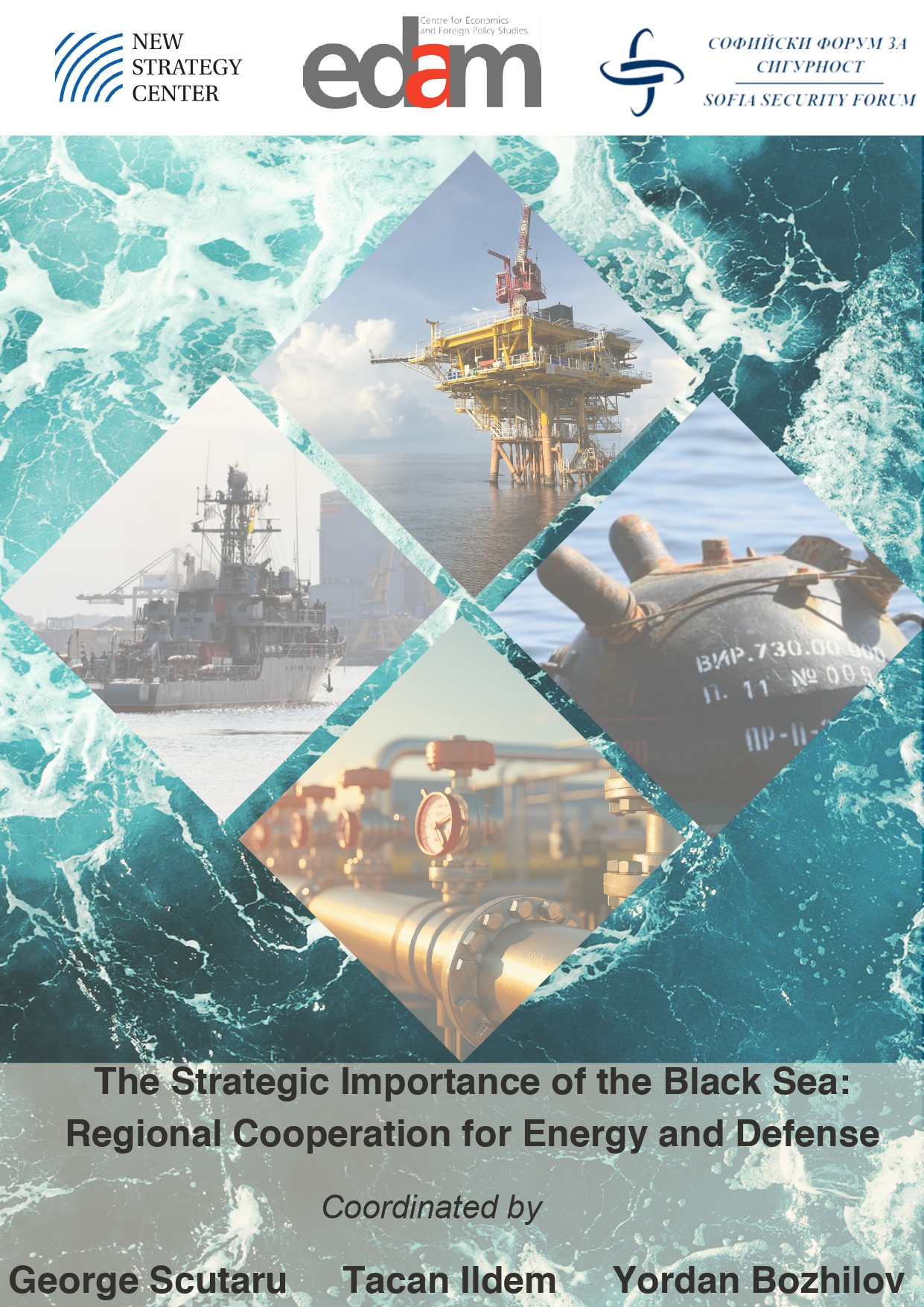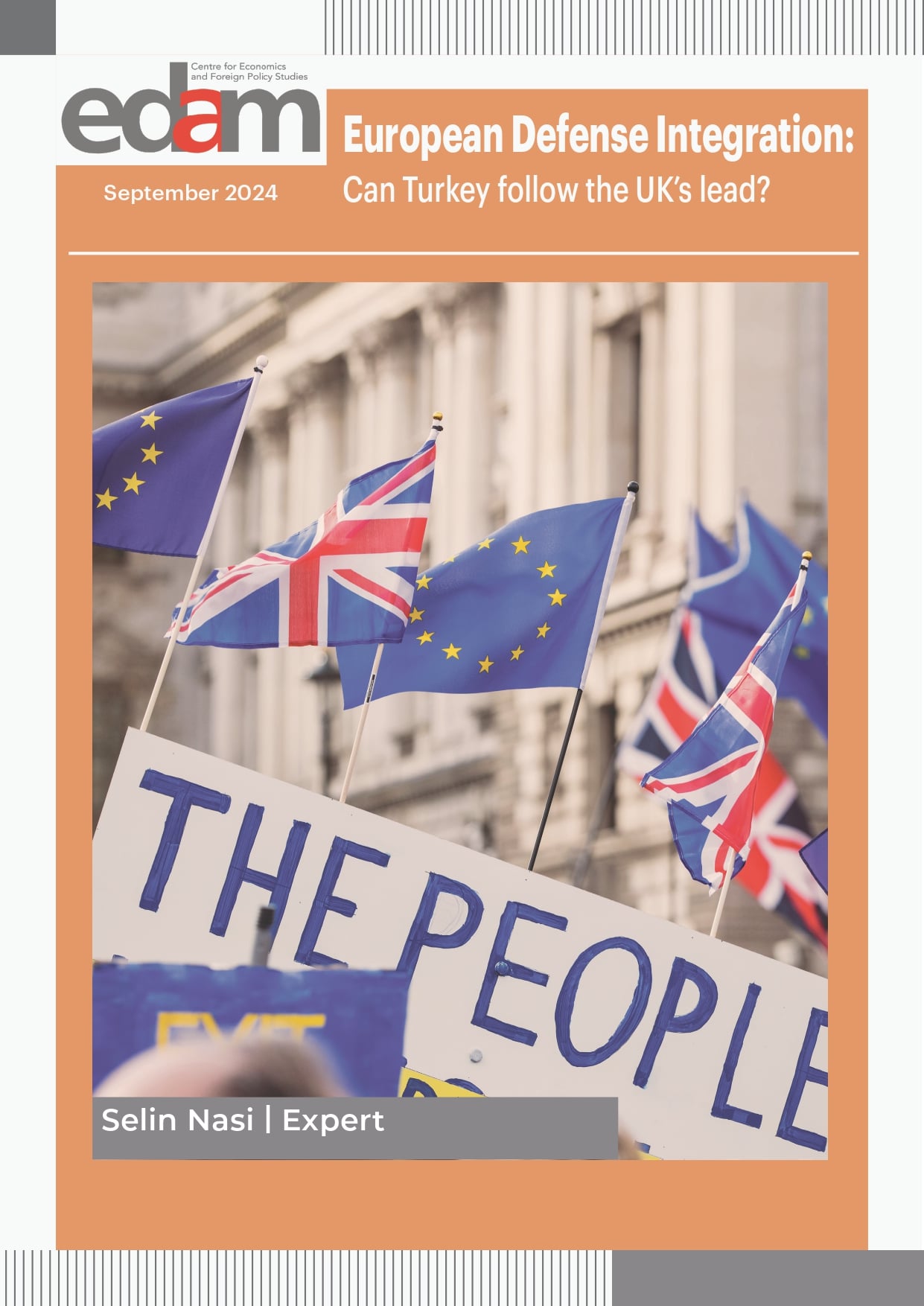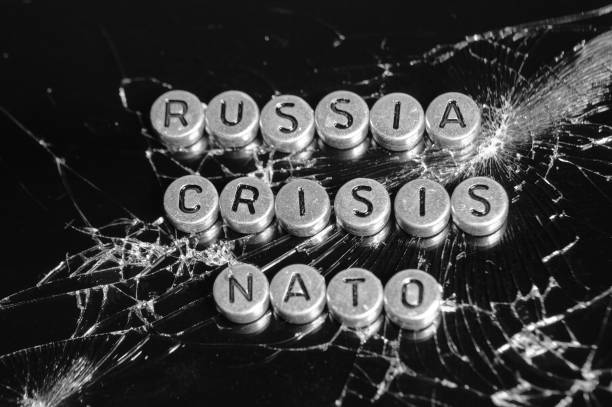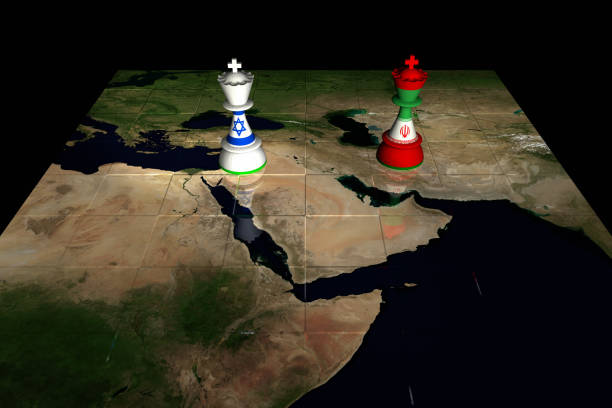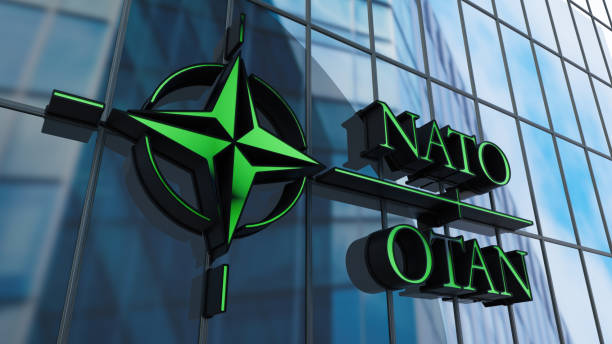Yayının İngilizcesine Ulaşmak İçin Tıklayın
INTRODUCTION
Tectonic shifts in the balance of power between the key players in the post-Soviet area will take place within the next decades. One of the main beneficiaries of this geostrategic earthquake could be Turkey, an emerging middle power, whose influence in the former USSR has increased significantly over the past decade.
Russian influence in the post-Soviet area has significantly weakened since the collapse of the USSR, especially in the South Caucasus and Central Asia. Russia had a monopolistic position in this part of the world in the early 1990s. Now, the game on the ‘post-Soviet chessboard’ is being played by several players. They are the four giants: Russia, China, the EU (internally diversified) and the USA. Increasingly heavyweight are also the two neighbouring middle powers: Turkey and to a lesser degree Iran, as well as India, Japan, and South Korea. The influence of the EU and the USA has considerably strengthened in the Black Sea basin and to a lesser extent in Central Asia since 1991. Such post-Soviet countries as Georgia, Azerbaijan and Moldova are Western-oriented primarily in economic terms, but also somewhat in political terms . Western countries are also important political and economic partners for such key post-Soviet countries as Kazakhstan and Ukraine. China, however, boasts the most spectacular increase in influence. It is gradually becoming the number one power in Central Asia, though it still must reckon with other players, especially Russia. Over the past few years, China has also gained, for the first time since the collapse of the USSR, the position of a stakeholder, albeit not the first ranking player, in the Caucasus and Eastern Europe. Beijing’s rising influence in the former USSR is an effect of the significant intensification of the asymmetrical – and more beneficial for China – economic and political links between China and the much weaker Russia.
Although, Russia has been making efforts to regain influence in the region over the past few years (the Georgian War, the Customs Union between Belarus, Kazakhstan, and Russia), considering the economic and demographic prospects, one should expect a further gradual weakening of Russian influence. At the same time China, and to a lesser degree the West, are enhancing their presence. The prospects for the EU’s importance in the region will depend on the ability of the EU to enlarge to the East and the advancement of integration inside the EU. Nevertheless, Moscow will remain a significant player in the former USSR for the next 20 to 30 years. The balance of powers in this so-called first league can also be altered if ambitious second-league players join the giants. Turkey is certainly a country with this potential. According to demographic forecasts, the population of Turkey in 2050 will reach about 95 million, reducing Russia’s demographic advantage over Turkey significantly.[1] By the middle of the century, the Turkish economy is likely to enter the exclusive club of the world’s top 10 economies and will be only slightly smaller than that of Russia. Turkey also has a chance of joining the most developed countries in the world in terms of national income per capita. However, whether Turkey will be able to use this potential to its full extent will depend on the way it copes with several serious internal challenges. The most important one is the Kurdish question. The main prerequisite of Turkey’s internal stabilization remains full-fledged democratization and modernization. The factor that could decisively contribute to the success of these processes and could translate to reinforcing Turkey’s influence in neighbouring regions, is EU membership. The European perspective, however, is currently highly uncertain due to opposition from key EU member states (France and Germany).
In the first part of this article, the significance of the post-Soviet area in Turkish foreign policy will be presented in various fields: geopolitical, energy, regional co-operation, economic and social. The second part will be devoted to Turkey’s relations with Russia, the most important of the post-Soviet countries. The next paragraph will outline Turkey’s relations with the Central Asian republics and Azerbaijan, including the cultural, identity and energy issues. The third part will concern the position of Turkey in its immediate neighbourhood, i.e. the Black Sea basin, where Ankara’s interests cross with EU and Russian interests. Last but not least, the final part will raise the issue of prospects for Turkey’s engagement in the post-Soviet area in the next few decades.
Position of the Post-Soviet Space in the Turkish Foreign Policy
Turkey’s foreign policy is currently much more multidimensional than in the previous decades. The post-Soviet vector must compete with more important directions in Turkish foreign agenda such as the EU and the Middle East.[2] Nevertheless, the post-Soviet area plays a very important role in Turkey’s foreign policy for geopolitical, security, economic and cultural reasons. In addition to the Middle East proper (Mashrek), the post-Soviet area is where Turkey has the greatest influence in the world. Its influence has significantly increased over the past decade, as a result of policy based on the ‘strategic depth’ concept launched by the ruling, post-Islamist, Justice and Development Party (the AKP). According to this doctrine, Turkey is uniquely endowed in geopolitical (a pivotal, central state), economic (emerging power) and historical terms (the Ottoman legacy) and thus, should be a proactive leader (stability provider) in the surrounding regions, including the Western Balkans. This soft power-oriented doctrine focuses on the peaceful coexistence of various ethnic and religious groups and the establishment of strong economic and social interdependencies between states and societies. In implementing this doctrine, Turkey aims to play a mediating role in the international and regional arenas. Due to the Arab spring, this doctrine is currently undergoing a substantial reshuffle.
The geopolitical factor of key significance for Turkey’s engagement in the post-Soviet area is its direct border with the South Caucasus, which forms a bridge to Central Asia and a transit region between Europe and China, rich in natural resources. Central Asia is also the ‘gate’ to Afghanistan, where Turkey has strong military and economic engagement and where, along with Pakistan, it has a substantial impact on regional and global security. For Ankara, the Black Sea is a frontier area, where it borders directly or indirectly with Russia, the most powerful state located in its neighbourhood; the European Union (Bulgaria and Romania), which is still Turkey’s most important economic and political partner; and Ukraine, the third-largest country by population and size of economy in Turkey’s direct neighbourhood.
The post-Soviet area, given its proximity, is also important for Turkey in the context of its hard and soft security. Four frozen conflicts (Abkhazia, South Ossetia, Nagorno-Karabakh and Transnistria) exist in the Black Sea region, and can easily escalate as the Georgian war of 2008 clearly demonstrated. Furthermore, for most of the past 15 years, the North Caucasus has been an arena of incessant rebellions of separatists and Islamic radicals within Russian territory.
The post-Soviet area is also important for Turkey in the context of its energy security. It is both a major potential source of diversification (possible gas supplies from the Caspian Sea region) and a potential threat to Turkey’s energy security (dependence on Russian gas). The post-Soviet space posses also a substantial significance for Ankara in the context of its aspirations to play the role of an energy hub in Eurasia.[3]
The region is also important for Turkey in terms of culture and identity. It is home to millions of Muslims and Turkic peoples. Public opinion polls have shown that Turks declare warm feelings only for their kinsmen from the post-Soviet area and Muslims from the Balkans. Yet at least a few million Turkish citizens have ethnic roots in the Caucasus and Crimea. The recent democratisation of Turkey has contributed to a clear development of their ethnic awareness and affiliation to their former homelands[4].
Former Soviet republics are vital for Turkey as an arena of rivalry and/or co-operation with global and regional powers (China, Iran, Russia, the EU and the USA). Turkey is presently conducting a multidimensional policy in the post-Soviet area, attempting to gain optimal influence in the region by manoeuvring between these players. One can notice that Turkey’s policy toward the key actors in the post-Soviet area has attempted to build better relations with each player separately than exists between the other players (with the exception of the USA-EU pair). Turkey needs to manoeuvre in this way because it is weaker than the other players, with the exception of Iran. However, Turkey’s zigzags sometimes incidentally also give rise to tensions with the above-mentioned states.
On the other hand, Turkey’s relations in the post-Soviet space with the USA (after 2003) and the EU (after 2005) deteriorated, processes felt most strongly in the Black Sea region. This deterioration stemmed from the crisis of the Turkish EU accession process, the emancipation of Turkish foreign policy and Ankara’s opposition to the USA’s intervention in Iraq. With regard to the US-Turkish relations, a radical amelioration can be currently observed.
An Eagle’s Eye View on Turkish Engagement in the Former USSR
Certain constant elements can be observed in Turkish policy in the post-Soviet area in the last decade:
· exploitation of Turkey’s role as an important transit route for post-Soviet trade (Anatolia as a bridge between Europe and Caucasus, Central Asia, the Straits as the gate to the Black Sea);
· promotion of regional co-operation (the Black Sea Economic Co-operation, the Council of Turkic Speaking States, the Economic Co-operation Organisation – Central Asia, Azerbaijan, Iran, Turkey, Afghanistan and Pakistan);
· efforts under the ‘strategic depth’ policy to establish good political and economic relations with all post-Soviet states. As part of this policy, Ankara has established, or is intending to establish High Level Co-operation Councils, or has signed strategic partnership agreements with most post-Soviet states;
· attempts at playing the role of a middleman between the post-Soviet states and the West and to become a key transit country between them;
· use of the multipolar foreign policy of post-Soviet countries to boost bilateral relations with them;
· neutral stances on the political character of post-Soviet regimes, with exemption of the most severe forms of repression (massacre in Andijian in Uzbekistan in 2005), a rather neutral approach to political pro-democratic revolutions (Georgia, Ukraine), but also sometimes affirmative (Kyrgyzstan), Turkey’s position can be described as more or less between the West and Russia on these issues;
· focus primarily on the South Caucasus within the Black Sea region;
· approval of EU engagement in the Black Sea region (participation in the Group of Friends of Eastern Partnership and a proposal on intensifications of relations between the EU and the Black Sea Economic Co-operation) and of the EU’s possible enlargement to the East on the condition that Brussels accepts Turkey’s membership and recognises Ankara as a key partner whose interests should be taken into account in EU Neighbourhood Policy;
· an approach of skepticism to substantial increases in NATO’s military presence in the Black Sea region and NATO enlargement in the post-Soviet area – albeit not uncompromising, given the significance of relations with the USA. Skepticism of an increased NATO presence derives from the fundamental significance of the Montreux Convention (1936) for Turkey (control of the Straits), which limits traffic through the Straits for warships of non-Black Sea region located states, and also from fear of an aggressive Russian reaction, which the West would not be able to counter (2008 Georgian scenario);
· closer co-operation – albeit not unconditional – with the USA on energy and hard security issues in the Caspian Sea basin than in the Black Sea region. This is due to the strong position of Russia and China in Central Asia;
The post-Soviet area is important to Turkey for economic reasons. The share of post-Soviet states in Turkey’s trade balance in 2011 reached 12 percent.[5] CIS markets are playing a vast role in the Turkish economy in the context of its specialite de la maison, the construction sector. Over the past 30 years, almost 45 percent of all foreign construction contracts signed by Turkish firms have been implemented in what is now CIS area. Their value reached approximately US $80 billion (1 January 2011).[6] CIS markets are also major destinations for Turkish direct investments abroad. Approximately 30 percent of Turkish foreign investments has been directed to post-Soviet countries. CIS countries are also the main recipients of Turkish development aid.[7] From 2005-2010, Turkey offered aid to post-Soviet countries worth around US $2 billion. It formed approximately 60 percent of all bilateral development aid granted by Turkey (a vast amount of which went to Turkic countries).[8] Tourism is one of the key sectors of the Turkish economy and Turkey is a popular destination for tourists from the former USSR. In 2011, tourists from the Commonwealth of Independent States and Georgia accounted for over 20 percent of all arrivals to Turkey. Citizens of most post-Soviet countries do not need visas to enter Turkey. On the other hand, unlike Russia and to a lesser extent the EU, Turkey does not play a major role as a labour market for expatriate workers from the post-Soviet area, whose remittances are of great significance for several economies in the region. A definite majority of universities and secondary schools established by Turks abroad are located in the post-Soviet countries. Many students and state officials from post-Soviet countries received training in Turkey. Turkish religious organisations have also created close institutional bonds with their counterparts in post-Soviet countries. The Eurasia Islamic Council, which unites communities from the entire region, operates under the patronage of Ankara.
To sum it up, when all the elements of soft power present in Turkish foreign policy are put together (education, development aid, investments, construction contracts, share of trade balances, tourism, and institutional religious links), certainly the post-Soviet area is the region where Ankara’s activity is the greatest, even greater – despite widespread perception to the contrary – than in the Arab world[9].
The Turkish –Russian Relationship: A Strategic Partner or Still a Rival?
Russia, considering its economic, demographic and military potential, is for obvious reasons the most important partner for Turkey in the post-Soviet area. Russian-Turkish relations significantly improved in the past decade. The rapprochement has happened for many reasons, primarily because of rising awareness that endless rivalry is unfavourable to both sides. Moreover, the emancipation of Turkish foreign policy contributed to a greater convergence of interests between Moscow and Ankara. The deterioration of Turkey’s relations with the EU and the USA led Turkey to look for new partners. The establishment of closer bilateral economic bonds, however asymmetrical (Turkey depends on raw material supplies from Russia), also played a role. In political terms, Turkey has been drawn closer to Russia primarily as a result of its sceptical attitude to NATO enlargement in the post-Soviet space, a stronger US military presence in the Black Sea basin, and also, until recently, largely similar stances between Ankara and Moscow on security issues in the Middle East.
With regards to the economy, multidimensional links exist between the two countries: in trade, investments, the construction sector, the energy sector and tourism. Trade exchange between Turkey and Russia rapidly increased from 2000-2008.[10] However, the global economic crisis caused a reduction in the Turkish share of the Russian trade balance in 2009, when it fell to 4 percent.[11] Turkish exports to Russia correspond to as little as approximately 25 percent of Russian exports to Turkey. Turkey has no such trade deficit (in absolute numbers) with any other trade partner. The main products imported by Turkey from Russia are, obviously, raw energy materials (gas and to a lesser extent oil and coal). The energy sector has a vast impact on the asymmetrical nature of Turkish-Russian relations.[12] Russia is interested not only in exporting energy to Turkey, but also in the energy market of the Bosphorus. Gazprom has already signed agreements regarding the construction of energy infrastructure, including terminals and storage facilities, with Turkish partners and is additionally entering the gas distribution sector. Russia is also planning to buy or build gas power plants. Turkey is also an important country for Russia in terms of the transit of raw materials. A significant portion of Russian oil is now transported by tanker ships through the Straits. Annually, approximately 10,000 tanker ships go through the straits, which accounts for almost 4 percent of global transit. For security reasons, Turkey is interested in reducing the traffic through the Straits by building the Samsun-Ceyhan oil pipeline. This project is vital for Turkey, given its plans to transform the Ceyhan port into an energy hub receiving oil from Iraq, the Caspian Sea region and Russia. Moscow, after several years of resistance, supported this project in 2010, but froze it in Autumn 2011 because it is developing a pipeline infrastructure in its own territory in the northern direction. In effect, the two parties have not been able to agree on the quantities and transit fees of oil to be transported by means of this pipeline. On the other hand in December 2011, Turkey, after long deliberations, gave the green light to the construction of the South Stream gas pipeline through its territorial waters, on the condition of fulfilling environmental requirements. Russia’s South Stream project aims at diminishing the importance and prosperity of the Nabucco.[13] In turn, for Ankara’s green lighting of South Stream, Moscow reciprocated with a significant decrease in gas prices. Since the contracts provide for excessive quantities of gas to be supplied to Turkey, Turkey still wants to renegotiate its contracts with Gazprom, because of its obligation to purchase the entire quantity of gas ordered (the ‘take or pay’ principle).
Close links between Russia and Turkey in the energy sector may also soon be extended to nuclear cooperation. Turkey is planning to build several nuclear power plants, including one to be built by Russia. In 2010, Ankara signed a contract with Russia on the construction of its first nuclear power plant, which – if completed – would mean the implementation of a gigantic Russian investment in Turkey, since its estimated value is US $20 billion. The contract provides that Russia would keep a controlling stake and be fully responsible for the plant’s operation (nuclear fuel supplies). The Russian nuclear power plant may make Turkey more dependent on Russia, unless the Turkish energy balance is diversified. On the other hand, it is worth noting that the risk Russia could use energy blackmail against Turkey is reduced by the existence of LNG ports in Anatolia and Ankara’s control of the Straits.
Russia is the most important global market for Turkish construction firms and in turn, Turkey becomes the top destination for Russian tourists. The total value of accumulated Turkish construction investments in Russia on 1 January 2011, exceeded US $33 billion (almost 20 percent of all Turkish foreign construction contracts). Turkey is also a very popular destination for Russian tourists. In 2011, 3.5 million Russian citizens visited Turkey, the largest number after Germans.[14] Their number accounted for over 10 percent of all foreign tourists.
However, links between Russia and Turkey in the field of culture are much weaker than in the areas of economy and politics. This situation is surprising given that Russian Muslims, who account for approximately 15 percent of Russia’s population, are of Turkic and Caucasian background, and as such share some common features of history and culture with Turkey. Despite this, proportionally very few students from Russia study in Turkey.[15] This is the effect of a policy pursued by the Russian government, which is not interested in strengthening Turkish influence among its Muslim citizens. This approach should be recognized as contrary to Russia’s national interests. For instance, in the case of the Northern Caucasus, Turkey could have weakened the influence of radicals through investment, trade, development aid, and the promotion of moderate Islam. A similar process is currently taking place in Serbia, with Belgrade’s consent.
Building closer relations between Turkey and Russia does not mean that a strategic partnership exists between these two countriesCertainly, economic bonds have given rise to a strong pro-Russian business lobby in Turkey ( construction companies, tourism agencies and partners of Russian energy firms), which has an influence on the Turkish government’s policy toward Russia. On the other hand, Turkey is making strong efforts to develop economic and political relations with Turkic republics within the Russian Federation: Tatarstan and Bashkiria. Kazan, the capital and largest city of the Republic of Tatarstan, has become a ‘must see’ for official Turkish delegations, including the prime minister and president, during their visits to Russia. Nevertheless, Turkish-Russian co-operation is still accompanied by rivalry and different stances on some key international issues (Cyprus, Kosovo, Bosnia, the NATO antimissile radar deployed in Turkey, Syria and possible transit of Iranian gas through Turkey to Europe). Kurdish organisations linked to the Kurdistan Workers’ Party (PKK), which has been at war with Turkey for over 30 years, still operate in Russia – although on a much smaller scale than in the 1990s. Despite insistence from Turkey, Russia has not put the PKK on the list of terrorist organisations. On the other hand, Turkey has restricted – but not eliminated completely – the activity of anti-Russian Caucasian circles in its territory. Turkey has a more positive attitude than Russia to the EU’s activity in the post-Soviet area. For example, Turkey, unlike Russia, joined the Group of Friends of the Eastern Partnership. Ankara has, or has had, over the past few years clearly improved relations with some of the post-Soviet states than Russia (Azerbaijan, Georgia, Moldova, Ukraine under the ‘Orange’ government and Turkmenistan). In turn, Russia has much better relations with Uzbekistan and Armenia. In the Azeri-Armenian conflict, Turkey and Russia are the most important allies for these two bitter enemies: Ankara for Baku and Moscow for Yerevan[16]. From 2008-2010, Turkey’s expectation that Russia, given the significance of bilateral relations, would contribute to progress in the peace process concerning Karabakh and thus enable the improvement of Turkish-Armenian relations, turned out to have been groundless. The status quo in Karabakh is beneficial for Russia because it can control Armenia by divide et impera. Moreover, Moscow benefits the most from a scenario in which the normalisation of Turkish-Armenian relations ends in a failure and, at the same time, Turkish-Azeri relations fall into a long-standing crisis. In the case of the post-Soviet area, Russia and Turkey have adopted different stances on some energy issues. As already mentioned Turkey still supports the Nabucco gas pipeline and would like to become a transit route for Iranian and Turkmen gas, while Russia has a negative approach to the former project and to possible entry of Turkmen gas into the European market outside of its control. Russia, unlike Turkey, is also negatively disposed to the transit of Kazakh oil via the BTC pipeline, which is necessary for the pipeline to be cost-efficient in the long term.
The Black Sea Courtyard
Turkey, after Russia, is the second most important player in the Black Sea region. Turkish-Russian relations are the pivot that organises the balance of power in the region. Ankara is interested in avoiding the upset of this balance and confrontation with Moscow, in which case it would find itself on the frontline without any guarantee of significant support from the West.The war in Georgia was clear proof of that. For this reason, Turkey does not wish the influence the external players (especially the USA) to increase significantly in the region, because Russia strongly opposes this. On the other hand, Turkey, unlike Russia, does not oppose per se the engagement of the West, especially the EU, in the region because – as a player weaker than Russia – it needs the West to balance out Moscow’s advantage.[17] As part of this policy of balancing Russia, Turkey in 2011 established closer co-operation with Romania and Ukraine, the countries which, after Russia and Turkey, have the greatest potential in the region.[18]
No other post-Soviet country has such close relations with Turkey as Azerbaijan. Cultural and identity factors are especially important in these relations. Both countries declare officially that they are “one nation, two countries.” The best proof of the exceptional Turkish-Azeri bonds is their close military co-operation (exercises, equipment, scholarships, training and financial aid). On the other hand, an attempt to normalise Turkish-Armenian relations (2008-2010) gave rise to the most serious crisis in Turkish-Azeri relations in history. Although this crisis was overcome, it has reduced Baku’s confidence in Ankara. As a consequence of these close bonds, Azerbaijan has a large potential to influence Turkish foreign policy, which it proved in 2009-2010 by lobbying successfully against the normalisation of relations between Ankara and Yerevan[19]. Another foundation of good Turkish-Azeri relations is their very close energy co-operation (transit of Azeri gas to Europe and Azeri gas supplies to Turkey), which considerably intensified in 2011.[20]
Turkey occupies an important place in Azerbaijan’s trade volume (an 8 percent share of the Azeri trade balance). Turkey is the most important foreign investor in Azerbaijan (approximately 15 percent of investments), which – if the merely formal investments in Holland are disregarded – is ranked number one on the list of Turkish foreign investments. Turkey is also the most important market for Azeri foreign investments, which account for several percent of all foreign direct investment in Turkey. In the immediate future, owing to the implementation of planned investments in the Turkish energy sector, Azerbaijan will gain the status of one of the largest foreign investors in Turkey.[21] Turkey is also playing a major role in the construction sector of Azerbaijan, where Turkish construction firms implemented contracts worth US $4.6 billion.
Turkey is also a popular destination for students from Azerbaijan. In the academic year 2010/2011, over 3,500 students from Azerbaijan studied at Turkish universities.[22]In turn, many Turks are studying in Azerbaijan.[23] Turkey has also opened an university and numerous secondary schools in Azerbaijan. The Turkish university is considered to be the best in Azerbaijan. Azeris go often on holidays to Turkey. Almost 600,000 Azeri citizens visited in 2011.As regards to the Black Sea basin, Turkey’s influence is thus strong in the Southern Caucasus (Georgia and Azerbaijan) and limited in Armenia. Its position is much weaker on the northern coastline of the Black Sea (Moldova and Ukraine) than in the southern part (Georgia, Armenia, Azerbaijan). The greatest shortcoming of Turkey’s position in the region results from the lack of diplomatic relations with Armenia and the closed border between the two countries. The most serious points of dispute include the international campaign launched by Armenians for the recognition of the massacres committed by the Young Turks regime in the Ottoman Empire from 1915-1916 as genocide. The Armenian genocide issue, together with the Armenian occupation of nearly 15 percent of Azerbaijan’s territory, are serious difficulties for Turkey in relations with its key international partners, i.e. the USA and the EU. In 2008-2010, Turkey made attempts to normalize relations with Armenia. Turkey has been criticised for the groundless linking – under the Azeri pressure – of the normalization of relations with the Karabakh issue, but on the other hand, it is impossible to negate a link between these two issues.[24]
Relative to its influence in other Black Sea neighbours, Turkey commands the most clout in Georgia. It is also a country of key significance for Turkey in terms of energy issues and transport (a corridor to Azerbaijan and Central Asia). Like with Azerbaijan, Turkey’s significance in Georgia is demonstrated most clearly by the key role Ankara has been playing in the development of the Georgian armed forces (equipment, training, infrastructure development and manoeuvres). In turn Abkhazia, a separatist entity, represents the most serious source of tension between Turkey and Georgia. Abkhazia is trying to expand its room to manoeuvre in its dealings with Russia, though Moscow is still seen by Abkhazians as their main protector, and with Georgia through developing relations with Ankara.[25] Turkey is open to developing informal co-operation with Abkhazia, which has met with a negative reaction from Georgia (arresting ships going between Abkhazia and Turkey).
Turkey is the key promoter of regional co-operation in the Black Sea basin. The Black Sea Economic Co-operation (BSEC) was established on Turkey’s initiative in 1992. Bilateral conflicts and the major differences between its members have made BSEC an unsuccessful attempt at regional co-operation. On the other hand, some progress has been made over the almost 20 years of institutional co-operation in the region, and no other competitive regional organisation has been established. Turkey is also the main promoter of military co-operation in the Black Sea basin. On its initiative, the Black Sea Force (a navy task group) was established in 2001, and the joint anti-terrorist operation, Black Sea Harmony, was launched in 2006. All countries with access to the Black Sea participate in the Black Sea Force. In turn, the participants of Black Sea Harmony are Turkey, Russia, Ukraine and Romania only.
Turkey is a key trade partner for Abkhazia (the largest partner accounting for approximately 50 percent of its trade volume) and Georgia (first largest partner accounting for approximately 15 percent of Georgian trade volume). It is also playing a rather significant role in the trade balances of Armenia, Moldova and Ukraine (3.5-6 percent of the trade volume of each of the countries).[26] In the case of Georgia, Turkey is also a very important investor (10 percent of FDI stocks). Turkey is also playing a vital role in the Georgian construction sector.[27] Additionally, Turkey is among the major sources of development aid for Gagauzia (Moldova), Crimea (Tatars) as well as Adjara and Javakheti (Georgia), regions inhabited by Muslims and/or Turkic peoples. Residents of Georgia proportionally visit Turkey most frequently of all foreign tourists. In 2011, over one million of arrivals of Georgians to Turkey were registered. It is also quite frequently visited by tourists from Ukraine and Moldova, and even Armenia.[28] Students from the Black Sea basin are not numerous in Turkey. However, Turkish grants are important for the Tatars in Crimea and also populations in Gagauzia, Adjara and Javakheti.[29]
A Promotion to the First League?
Turkey’s leverage in the post-Soviet space is relatively significant. An evaluation of Turkey’s performance would be particularly favourable for Ankara when compared with the much-weaker leverage of Iran, a country with similar potential.[30] However, despite a recent substantial increase of its engagement, Turkey remains a second-rank player in the region in comparison to other major actors. This state of affairs finds expression in the character of the Turkish engagement, which is rather cautious, evolutionary (a step-by-step approach), sometimes reactive, and generally without an assertive agenda (in terms of lacking strong support for rapid and comprehensive modernization and democratisation and decisive change of geopolitical status quo). Other reasons for the situation are Turkey’s internal constrains (unfinished democratization and modernization) and tensions between Turkey and the EU, and to a lesser degree the US, the most change-oriented players in the post-Soviet space.
In coming decades, Turkey can indeed become one of the most important players in the region, with a position similar to that of Russia, if it succeeds in resolving its major internal problems. The EU accession process would certainly facilitate this and at the same time would considerably strengthen an influence and assertiveness of Ankara – and by default Brussels’ leverage – in the post-Soviet area. If Turkey’s integration process finds itself in a permanent stalemate, the growth of its potential, activism and influence in the post Soviet space is likely to be more limited. In return, this scenario will be beneficial for China, Russia and Iran, powers aiming at tactical co-operation with Turkey at the expense of Western interests. However, the establishment of tangible anti-Western strategic partnerships between these players and Turkey is highly unlikely because of insufficient convergence of their interests.
The evolution of the Turkish-Russian relationship will be determined by the fact that the population and size of the economy of Turkey will probably become similar to those of Russia, and will be influenced by the internal political evolution of Russia. A process of modernisation and democratisation will bring Russia closer to the West and Turkey, and contribute to its development of a more pragmatic and constructive policy in the post-Soviet area. On the other hand, the political and economic transformation could result in internal turmoil in Russia, weakening its grip on the region. However, a further gradual decline of Russia’s leverage in the region, without serious internal changes in Russia, may put the stability of the post-Soviet area at risk, because a desperate Moscow aiming at the preservation of its position would increasingly often use hard power, especially with regard to the West, Turkey or Iran, and to a lesser extent toward China. Another major factor influencing Turkish-Russian relations will be the increasing significance of Muslims in Russia. The share of Muslims will increase strongly, even up to 30 percent by 2050. Russian Muslims are of Caucasian or Turkic origin and may play the role of a Turkish lobby in Russia. However, Russia may maintain a clear advantage over Turkey if the Turkish energy balance is not diversified and if its dependence on Moscow is not reduced.
In turn, Turkey’s position in the Black Sea basin will depend to a certain degree on its ability to intensify economic and political relations with Ukraine, state number three in this region. Approximation with Kyiv could be of great benefit to Ankara in counterbalancing Moscow.
[1] According to UN forecasts made in 2006-2010, the Russian population will shrink, according to an averaged scenario, from over 140 million to approximately 105-125 million. UN, Department of Economic and Social Affairs, World Population Prospects, the 2010 Revision, http://esa.un.org/unpd/wpp/
[2] Despite a serious stalemate of the Turkish accession process and the widespread opinion among experts of Turkey’s lost of interest in the EU, Ankara’s relations with the European Union maintain objectively a very high position in the Turkish agenda due to several factors: The EU’s crucial share of the Turkish trade turnover, FDI stock and revenue from tourism, the Cyprus issue, EU engagement in Turkey’s neighbourhood and the huge Turkish diaspora in the EU. The significance of the Middle East in the Turkish foreign policy is linked to the post-Islamist character of the ruling AKP party and the instability of the region (the USA’s invasion of Iraq, the Israeli-Arab confrontation and the Arab Spring).
[3] Currently, Azeri gas is transported through the Baku-Tbilisi-Erzurum gas pipeline and Azeri oil through the Baku-Tbilisi-Ceyhan (BTC) oil pipeline. Turkey also plays quite an important role for Russian and Kazakh oil tanker ships going through the Straits and BTC (in the case of Kazakhstan) and for Turkmen gas, which in fact accounts for a significant share of the gas purchased by Ankara from Iran. Furthermore, the construction of the Nabucco gas pipeline and/or other pipelines between Turkey and the Caspian Sea (the Trans Adriatic Pipeline, TAP or the Trans Anatolian Pipeline, TANAP), the Samsun-Ceyhan pipeline (Russian and Kazakh oil) and Blue Stream II (Russian gas to the Middle East) oil pipelines together with a clear increase in the volume of transit of oil from Kazakhstan through the BTC oil pipeline would even further increase the role of Turkey as a transit state.
[4] For example, the family of Prime Minister Recep Erdogan originates from Adjara in Georgia.
[5] This share was the highest in 2008 (over 15 percent of the Turkish trade balance), and was as low as 4 percent in 2000. Turkey’s trade exchange with this area is characterised by a high deficit resulting from the fact that Turkey is importing very large amounts of raw materials from post-Soviet countries. In effect, Turkey’s export is equivalent to only 40 percent of its import from the former USSR.
[6] Türkiye Müteahhitler Birliği, Türk Yurtdışı Müteahhitlik Hizmetleri, http://www.tmb.org.tr/genel.php?ID=10
[7] Turkic ethnic communities from Russia are also members of TURKSOY.
[8] Türk İşbirliği ve Kalkınma İdaresi Başkanlığı, Raporlar, http://www.tika.gov.tr/TR/Icerik.ASP?ID=273
[9] The economic potential of the post-Soviet space and the Arab countries is similar. The value of trade volume and construction contracts between Turkey and the post-Soviet space on the one hand, and the Arab countries and Turkey on the other, is more or less at the same level. The Arab countries lead clearly in Turkish exports and the post-Soviet states hold stronger position in Turkish imports. The prevalence of the post-Soviet space is especially evident in the areas of development aid, tourism and education. From 2005-2009, post-Soviet countries received almost 3.5 times more Turkish development aid than Arab countries. Turkey is among the top donors in many of the post-Soviet countries. . Similar proportions apply to the comparison of the number of tourist arrivals from the post-Soviet countries and Arab states respectively. In the case of the latter, many visitors are in fact Kurds. Six Turkish universities operate in Central Asia and Azerbaijan and thousands of students from this region are studying at universities in Turkey. By comparison, only several hundred students from Arab countries (mainly Iraq and Syria) study in Turkey per year. Most of them are Kurds. Two universities have been established in Iraq; both, however, operate in the autonomous Kurdistan region. On the other hand, it should be admitted that Turkey has been seriously engaged in the post-Soviet area for 20 years, while in the Arab world for less than a decade.
[10]Turkish and Russian data: T.C. Ekonomi Bakanlığı, Ülkelere Göre Dış Ticaret,
http://www.ekonomi.gov.tr/index.cfm?sayfa=7155BE01-D8D3-8566-45208351967592CF
[10] Türkiye Müteahhitler Birliği, Türk Yurtdışı Müteahhitlik Hizmetleri, http://www.tmb.org.tr/genel.php?ID=10
[11] At the same time, Russia became a key trade partner for Turkey (almost 10 percent of the trade exchange), rising to second place, just behind Germany. In 2008, Russia was ranked first. However, Russia is not a key outlet for Turkey. Only 4.5 percent of Turkish exports went to Russia in 2011.
[12] Turkey supplies from its own sources less than 30 percent of the energy it consumes. In turn, Russia is the most important supplier of its energy. Russia’s share in the Turkish import of gas exceeds 60 percent. Turkey imports almost 100 percent of gas, which accounts for approximately 30 percent of the Turkish energy balance. For Russia, Ankara is the fourth largest gas recipient (almost 10 percent of Russian gas exports). The share of oil in the Turkish energy balance is very similar to that of gas. Almost all oil is also imported. Imports from Russia account for approximately 25 percent of oil imports. In the case of coal, which has a similar share in the Turkish energy balance than gas and oil, the significance of Russia is much smaller. Turkey has its own coal deposits, so it imports only a minor share of the coal it consumes. Nevertheless, as regards coal imports, Russia is still number one supplier (over 30 percent).
[13] It should be noted that no feasibility study has been conducted in case of South Stream,, while it has already been completed for Nabucco.
[14] Republic of Turkey, Ministry of Culture and Tourism, Number of Arriving-Departing Foreigners and Citizens, http://www.kultur.gov.tr/EN/belge/2-27503/number-of-arriving-departing-foreigners-and-citizens.html
[15] In 2010, their number was approximately 500 and has been regularly decreasing since 2000, when over 1,000 students from Russia were studying in Turkey. Turkish school education development is also happening on a much smaller scale than the scale of the Turkic community could suggest. The UNESCO Institute for Statistics (UIS), Table 18A: International flows of mobile students at the tertiary level, http://stats.uis.unesco.org/unesco/TableViewer/tableView.aspx
[16] It is worth remembering that 1.2 million Russian citizens are ethnic Armenians, and nearly half a million of Armenian citizens live and work in Russia. This is the second-largest Armenian diaspora in the world, after the diaspora in the USA. For comparison, the population of Armenia is less than 3 million.
[17] Turkey hoped, for example, that the USA and the EU would back it in the process of normalizing relations with Armenia by putting pressure on Yerevan.
[18] In 2011, Turkey signed a declaration of strategic partnership with Romania and an agreement lifting visas with Ukraine, established the High Level Cooperation Council with Kiev and launched negotiations on the free trade agreement.
[19] Turkish-Azeri relations are not perfect. They are not free of such ‘practical’ problems as high Azeri customs duty rates, lengthy controls on the Azeri border crossing points, visa requirements for Turkish citizens and problems Turkish citizens face with regard to obtaining work permits or residence permits in Azerbaijan. As far as the energy sector is concerned, Turkey is interested in the transit of Turkmen gas through Azerbaijan and Anatolia to Europe. Baku, however, perceives this development as a challenge for its economic interests in the short term.
[20]Azeri fuels are transported by the Baku Tbilisi Ceyhan (BTC) oil pipeline and the Baku Tbilisi Erzurum (BTE) gas pipeline, both which were put into operation in 2006. Azeri oil accounts for approximately 85 percent of the oil transported by BTC. In October 2011, Turkey and Azerbaijan signed a number of complex agreements determining the rules for the transit, supply, volumes and prices of gas, which Azerbaijan exports to Turkey (these documents had been undergoing negotiation for around three years and their finalisation had been postponed several times due to conflicts of interests). In December 2011, Turkey and Azerbaijan signed an agreement on the construction of the Trans Anatolian Gas Pipeline, which is supposed to transfer gas from Azerbaijan’s Shah Deniz fields to Europe. The construction is going to be launched as soon as possible – in 2012 – in order to be completed by late 2017. After achieving full operational capacity, the volume of gas flowing through Trans Anadolu will reach the level of 24 billion cubic meters. Enerjide dengeleri değiştirecek imza, Sabah, 27.12.2011, http://www.sabah.com.tr/Ekonomi/2011/12/27/enerjide-dengeleri-degistirecek-imza#
[21] In 2008 the Azeri oil corporation, SOCCAR, bought Petkim, Turkey’s largest petrochemical company for 2.5 billion USD . SOCCAR is to commence the construction of a large refinery worth 5 billion USD in Izmir 2012.
[22] In the 1990s, two-thousand Uzbeks were studying at Turkish universities, which made Turkey was the most popular place for Uzebeks to study abroad. The number of Uzbek students in Turkey today has been reduced to several dozen.
[23] In 2009, over 4,000 students from Turkey were studying at Azeri universities. They accounted for several percent of all students.
[24] The assumption that a normalization of Turkish-Armenian relations would accelerate the peace process seems somewhat naïve. Armenia can develop a greater sense of security only in the long term. Other important factors for the change of its stance are political change in Armenia (a removal from power of the nationalist clan originating from Karabakh) and Russia’s unchanging stance on the conflict over Nagorno-Karabakh. The best test of Armenian intentions was when the Armenian parliament voted conditionally against the protocols, which would place Turkey in a difficult situation.
[25] The president of Abkhazia accompanied by a very large delegation paid an unofficial visit to Turkey in April 2011.
[26] Turkey’s trade with Azerbaijan and Georgia will certainly increase, owing to the new railroad between Kars in Turkey and Akhalkalaki in Georgia, which is approximately 100 kilometres long and is planned to be put into operation at the end of 2012. In effect, Turkey will have a direct railway connection with Georgia and Azerbaijan, which will skip Armenia.
[27] By early 2011, Turkish construction firms implemented contracts in Georgia worth almost US $2 billion, 85 percent of which was carried out after the Rose Revolution. Meanwhile, from the collapse of the USSR until 1 January 2011, Turkey implemented construction contracts worth almost US $3 billion in Ukraine and approximately US $150 million in Moldova. Türkiye Müteahhitler Birliği, Türk Yurtdışı Müteahhitlik Hizmetleri, http://www.tmb.org.tr/genel.php?ID=10
[28] Almost 800,000 arrivals of tourists from Armenia, Moldova and Ukraine to Turkey happened in 2011. Proportionally, Moldovans visit Turkey most frequently.
[29] In 2010, almost 210 students from Ukraine (mainly Crimean Tatars), over 160 from Moldova (mainly the Gagauz) and 370 from Georgia were studying at Turkish universities.
[30] Iran does not possess more economic, social and political leverage than Turkey in any of post Soviet states, excluding Armenia, which, however, finds itself under Russia’s tutelage. Iranian influence is more or less comparable to Turkish influence in Tajikistan. The main shortcoming of Iran in the post Soviet space concerns its political theocratic system and confrontational foreign policy in the global arena.

